| Listing 1 - 10 of 50 | << page >> |
Sort by
|
Multi
ISSN: 16124545 ISBN: 3465032896 9783465032892 Year: 2004 Volume: 3 Publisher: Frankfurt am Main: Klostermann,
Abstract | Keywords | Export | Availability | Bookmark
 Loading...
Loading...Choose an application
- Reference Manager
- EndNote
- RefWorks (Direct export to RefWorks)
History of philosophy --- Theory of knowledge --- anno 500-1499
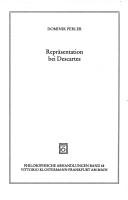
ISBN: 3465029100 Year: 1996 Volume: 68 Publisher: Frankfurt am Main Klostermann
Abstract | Keywords | Export | Availability | Bookmark
 Loading...
Loading...Choose an application
- Reference Manager
- EndNote
- RefWorks (Direct export to RefWorks)
Representatie (Filosofie) --- Representation (Philosophy) --- Représentation (Philosophie) --- Voorstelling (Filosofie) --- Idea (Philosophy) --- -Representation (Philosophy) --- -Representationalism (Philosophy) --- Representationism (Philosophy) --- Culture --- Philosophy --- Ideas, Theory of --- Ideas (Philosophy) --- Theory of ideas --- Knowledge, Theory of --- Memetics --- History --- -History --- -Descartes, Rene --- -Contributions in philosophy of idea --- Representationalism (Philosophy) --- Descartes, René, --- Descartes, Renatus --- Cartesius, Renatus --- Descartes, René
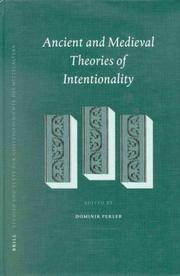
ISSN: 01698125 ISBN: 9004122958 9004453296 9789004122956 9789004453296 Year: 2001 Volume: 76 Publisher: Leiden: Brill,
Abstract | Keywords | Export | Availability | Bookmark
 Loading...
Loading...Choose an application
- Reference Manager
- EndNote
- RefWorks (Direct export to RefWorks)
This volume analyses ancient and medieval theories of intentionality in various contexts: perception, imagination, and intellectual thinking. It sheds new light on classical theories (e.g. by Aristotle and Thomas Aquinas) and examines neglected sources, both Greek and Latin. It includes contributions by J. Biard, M. Burnyeat, V. Caston, D. Frede, R. Gaskin, E. Karger, C. Michon, D. O'Meara, C. Panaccio, R. Pasnau, D. Perler, Ch. Rapp, P. Simons, R. Sorabji, and H. Weidemann.
Intentionality (Philosophy) --- Philosophy, Ancient --- Philosophy, Medieval --- Intentionnalité --- Intentionnalité (Philosophie) --- Philosophie ancienne --- Philosophie médiévale --- History --- Congresses --- Histoire --- Congrès --- 165.423.1 --- -Philosophy, Ancient --- Medieval philosophy --- Scholasticism --- Ancient philosophy --- Greek philosophy --- Philosophy, Greek --- Philosophy, Roman --- Roman philosophy --- Act (Philosophy) --- Mind and body --- Philosophy --- Intentionaliteit. Theory of meaning --- 165.423.1 Intentionaliteit. Theory of meaning --- Intentionnalité --- Intentionnalité (Philosophie) --- Philosophie médiévale --- Congrès --- Philosophy [Ancient ] --- Philosophy [Medieval ] --- Intentionality (Philosophy) - History - Congresses. --- Philosophy, Ancient - Congresses. --- Philosophy, Medieval - Congresses.
Book
ISBN: 3465031784 Year: 2002 Volume: 82 Publisher: Frankfurt am main Vittorio Klostermann
Abstract | Keywords | Export | Availability | Bookmark
 Loading...
Loading...Choose an application
- Reference Manager
- EndNote
- RefWorks (Direct export to RefWorks)
Filosofie [Middeleeuwse ] --- Intentionaliteit (Filosofie) --- Intentionality (Philosophy) --- Intentionalité (Philosophie) --- Medieval philosophy --- Middeleeuwse filosofie --- Philosophie médiévale --- Philosophy [Medieval ] --- Philosophy, Medieval --- Scholasticism --- Act (Philosophy) --- Mind and body --- Philosophy
Book
ISBN: 9780199935277 9780199935253 0199935254 0199935270 Year: 2015 Publisher: New York: Oxford university press,
Abstract | Keywords | Export | Availability | Bookmark
 Loading...
Loading...Choose an application
- Reference Manager
- EndNote
- RefWorks (Direct export to RefWorks)
It seems quite natural to explain the activities of human and non-human animals by referring to their special faculties. Thus, we say that dogs can smell things in their environment because they have perceptual faculties, or that human beings can think because they have rational faculties. But what are faculties? In what sense are they responsible for a wide range of activities? How can they be individuated? How are they interrelated? And why are different types of faculties assigned to different types of living beings? The six chapters in this book discuss these questions, covering a wide period from Plato up to contemporary debates about faculties as modules of the mind. They show that faculties were referred to in different theoretical contexts, but analyzed in radically different ways. Some philosophers, especially Aristotelians, made them the cornerstone of their biological and psychological theories, taking them to be basic powers of living beings. Others took them to be inner causes that literally produce activities, while still others provided a purely functional explanation. The chapters focus on various models, taking into account Greek, Arabic, Latin, French, German and Anglo-American debates. They analyze the role assigned to faculties in metaphysics, philosophy of mind and epistemology, but also the attack that was often launched against the assumption that faculties are hidden yet real features of living beings. The short "Reflections" inserted between the chapters make clear that faculties were also widely discussed in literature, science and medicine.
Ability --- Personality --- Intellect --- Intelligence --- Philosophy --- History. --- Philosophie --- Histoire --- History --- Aptitude --- Personnalité --- Philosophy. --- Personnalité --- Ability - Philosophy - History --- Personality - Philosophy - History --- Intellect - Philosophy - History
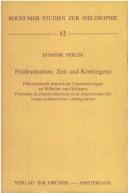
ISBN: 9060323106 9786613328380 1283328380 9027278776 9789060323106 9789027278777 Year: 1988 Volume: 12 Publisher: Amsterdam: Grüner,
Abstract | Keywords | Export | Availability | Bookmark
 Loading...
Loading...Choose an application
- Reference Manager
- EndNote
- RefWorks (Direct export to RefWorks)
Contingency (Philosophy) --- Philosophy, Medieval. --- Predestination. --- Time. --- Compatibilism --- Contingence (Philosophie) --- Contingentie (Filosofie) --- Determinism and free will --- Determinism and indeterminism --- Determinisme en indeterminisme --- Déterminisme et indéterminisme --- Free agency --- Free will and determinism --- Freedom and determinism --- Freedom of the will --- Indeterminism --- Indeterminisme --- Liberty of the will --- Libre arbitre et déterminisme --- Predestinatie --- Predestination --- Prédestination --- Temps --- Temps (Theologie) --- Tijd --- Tijd (Theologie) --- Time --- Time (Theology) --- Voorbeschikking --- Voorbestemming --- Vrije wil --- Vrije wil en determinisme --- Vrijheid van de wil --- Wilsvrijheid --- Metaphysics --- Christian theology --- Christian dogmatics --- Ockham, of, William --- Philosophy, Medieval --- #GROL:SEMI-1-05'13' Guil --- Medieval philosophy --- Scholasticism --- Philosophy --- Foreordination --- Religious aspects --- William of Ockham --- De Occam, Guillelmus --- Guillaume d'Occam --- Occam, Guillelmus de --- Ockham, William --- Van Ockham, Willem --- Von Ockham, Wilhelm --- d'Ockham, Guillaume --- Hours (Time) --- Geodetic astronomy --- Nautical astronomy --- Horology --- William, --- God --- Omniscience --- History of doctrines
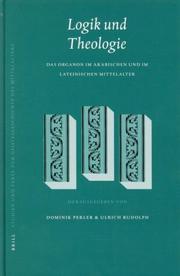
ISSN: 01698028 ISBN: 9004111182 9786610859030 1435655826 9047403983 1280859032 1433704706 9789004111189 9781435655829 9781433704703 Year: 2005 Volume: 84 Publisher: Leiden: Brill,
Abstract | Keywords | Export | Availability | Bookmark
 Loading...
Loading...Choose an application
- Reference Manager
- EndNote
- RefWorks (Direct export to RefWorks)
How did the reception of Aristotelian logic in the Arabic and Latin Middle Ages shape the development of theology? And how did theological issues influence the debates about logic and theories of argumentation? The contributions in this volume examine these questions on the basis of key texts, thus shedding new light on the problematic relationship between logic and theology.
Muslim logicians --- Islam and philosophy --- Logic, Medieval --- Catholic Church and philosophy --- History --- Congresses. --- Aristotle. --- 215.1 --- 215.1 Verhouding godsdienst en filosofie --- Verhouding godsdienst en filosofie --- Logiciens musulmans --- Islam et philosophie --- Logique médiévale --- Congresses --- Congrès --- Histoire --- Islamic logicians --- Logicians, Muslim --- Logicians --- Medieval logic --- Philosophy and Islam --- Philosophy --- Philosophy and the Catholic Church --- Philosophy and religion --- Aristotle --- To 1500 --- Logic [Medieval ] --- Aristotle. - Organon
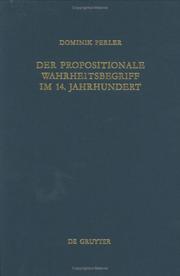
ISBN: 3110134152 3110863391 9783110134155 Year: 1992 Volume: 33 Publisher: Berlin: de Gruyter,
Abstract | Keywords | Export | Availability | Bookmark
 Loading...
Loading...Choose an application
- Reference Manager
- EndNote
- RefWorks (Direct export to RefWorks)
Logic, Medieval --- Proposition (Logic) --- Truth --- #GROL:SEMI-1'13/14' --- Language and logic --- Logic --- Medieval logic --- History --- Logic, Medieval. --- History. --- Vérité --- Proposition (Logique) --- Logique médiévale --- Histoire --- Truth - History. --- Proposition (Logic) - History.
Book
ISBN: 9783110189575 3110189577 128342889X 3110211610 9786613428899 Year: 2008 Publisher: Berlin: de Gruyter,
Abstract | Keywords | Export | Availability | Bookmark
 Loading...
Loading...Choose an application
- Reference Manager
- EndNote
- RefWorks (Direct export to RefWorks)
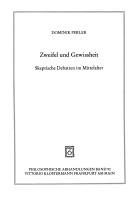
ISBN: 3465034961 Year: 2006 Publisher: Frankfurt am Main Vittorio Klostermann
Abstract | Keywords | Export | Availability | Bookmark
 Loading...
Loading...Choose an application
- Reference Manager
- EndNote
- RefWorks (Direct export to RefWorks)
Philosophy, Medieval --- Skepticism --- Scepticism --- Unbelief --- Agnosticism --- Belief and doubt --- Free thought --- Medieval philosophy --- Scholasticism --- History
| Listing 1 - 10 of 50 | << page >> |
Sort by
|

 Search
Search Feedback
Feedback About UniCat
About UniCat  Help
Help News
News